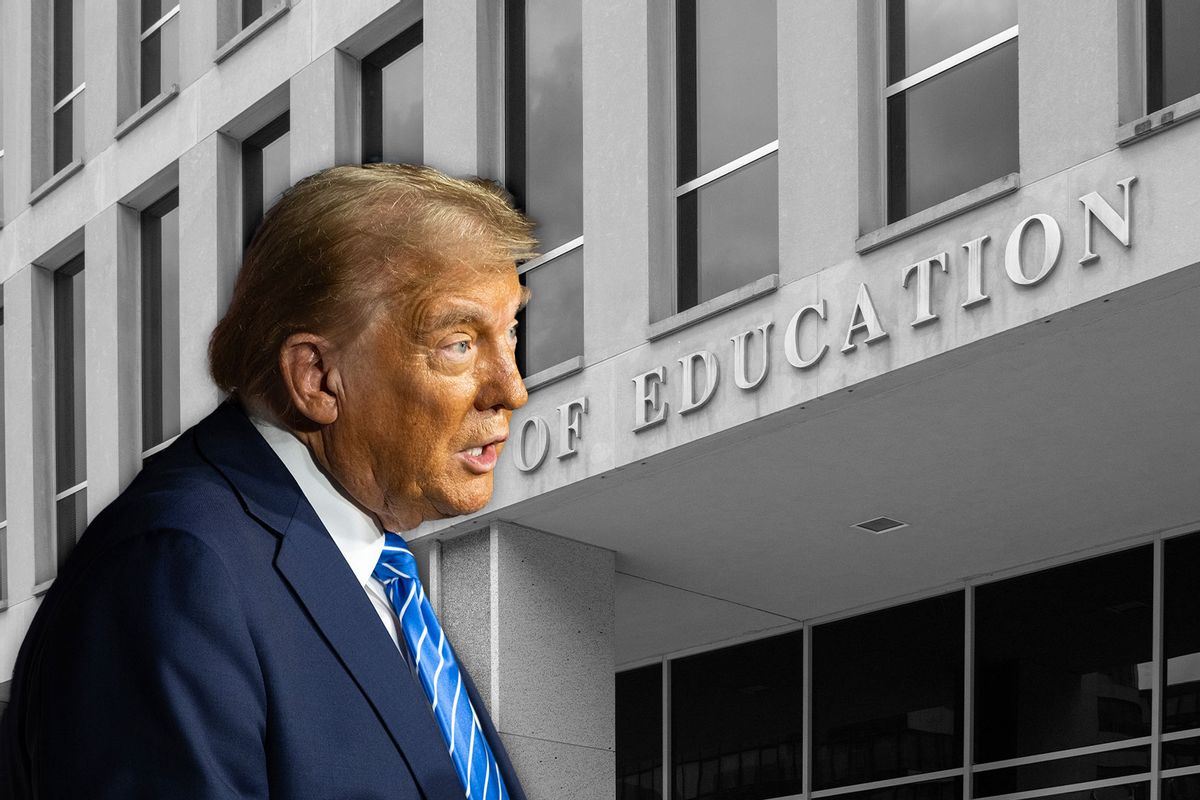Donald Trump has never made a secret of his antipathy to higher education, but scapegoating the academy has become a central preoccupation of his second presidential run. His running mate, JD Vance, has openly declared that universities are the enemy and championed an aggressive attack on them. Agenda 47, Trump’s collection of policy proposals, includes a pledge to protect students from the “radical left and Marxist maniacs infecting educational institutions.” This contempt for higher education is a powerful rallying cry in their larger rightwing populist campaign.
If Trump takes the White House in November his administration could abolish the Department of Higher Education, as called for by Project 2025; levy fines on universities and use them to fund an online university called American Academy; replace college accreditors as part of their crusade against the “radical left;” roll back diversity, equity, and inclusion efforts; and implement a host of other disastrous measures.
While many academics have sounded the alarm about Trump’s plans to gut academia, Trump is not without supporters in higher education. I have studied 198 leading conservative professors and found that 109 support Trump: “academic Trumpists.” These are professors who advocated and voted for Trump in 2016, supported his administration despite all its turmoil, and challenged the legitimacy of Biden’s win in 2020. A few even supported the January 6, 2021 assault on the Capitol. They are overwhelmingly white, male and tenured. Some, like Marshall DeRosa, Professor of Political Science at Florida Atlantic University, express their support in blunt terms. In 2016 he said, “I’m looking forward to voting for Trump, because I see him as a wrecking ball and I want to see those sons of bitches squeal in Washington, to be quite frank.” Trump now gives every indication that he will take his wrecking ball to higher education and, if he does, he’ll find some professors there to welcome him.
The most influential academic Trumpists include Victor Davis Hanson, fellow at the Hoover Institution and Hillsdale College, regular Fox News contributor, and whose book The Case for Trump was briefly on the New York Times best seller list; John Eastman, former professor at Chapman University School of Law, who spoke at Trump’s January 6, 2021 rally and presided over the legal rationale for Trump to believe he could obstruct the Congressional certification of Biden’s electoral victory; Peter Navarro, formerly at the University of California-Irvine, who as Trump’s White House economic advisor, advocated a trade war with China and claimed that it was “statistically impossible” for Trump to have lost the 2020 election. (Navarro was convicted on two counts of contempt of Congress and served prison time).
Not surprising, many academic Trumpists bemoan what they see as a stifling liberal campus culture. For Mark Bauerlein, retired from Emory University, academics are caught in a bind that only Trump can break: “bow down to diversity or risk your academic career.” Only Trump will fight against “identity politics [that] have overtaken scholarly standards.” In Out of Order: Affirmative Action and the Crisis of Liberalism, Nicholas Capaldi of George Mason University calls political correctness doctrinaire liberalism.”
They participate in and benefit from a vast conservative network beyond the academy. Three-fourths of the academic Trumpists affiliate with prominent conservative and powerful think tanks, such as the Heritage Foundation, the Claremont Institute, the Heartland Institute, the Ludwig Von Mises Institute, the Independent Institute, and the Federalist Society. A few Trumpists affiliate with smaller neo-Confederate think tanks such as the League of the South, the Abbeville Institute, and Stephen D. Lee Institute, which embrace white nationalism. The Claremont Institute stands out as the network hub. Eighteen of the academic Trumpists affiliated with the institute also have ties to 32 other conservative think tanks. There is no similar clustering of anti-Trumpist conservative professors around such right-wing centers.
Want a daily wrap-up of all the news and commentary Salon has to offer? Subscribe to our morning newsletter, Crash Course.
Despite the spectacular controversies surrounding the Trump White House only eight of the 109 Trumpists have rescinded their support since the 2016 election. Fourteen — notably John Eastman — joined Trump in claiming that the election was stolen from him by voter fraud.
In a polarized political environment, it can be easy to forget that political camps are not monolithic. To be a conservative is not necessarily to champion Trump. Conservative professors who don’t support Trump include Harvard government professor Harvey Mansfield who considers Trump a “demagogue.” Robert P. George, at Princeton University, “fiercely opposed” Trump the candidate, saying he was “a person of poor character.” Jon A. Shields at Claremont McKenna College, said “I wouldn’t vote for Trump under any condition.”
Right-wing populism—the kind that Trump evokes when he condemns higher education as a bastion of sinister elites—is the key dividing line. The academic Trumpists support it, the anti-Trumpists professors do not. In their book, Passing on the Right, Jon Shields and Joshua Dunn noted that “conservative professors…look askance at the populism that has shaken up the Republican Party in recent years.”
It is these conservative professors who liberal academics must unite with to stand against Trump’s increasingly strident attacks on academia. Our political differences may be vast, but we agree on the value of higher education and understand that to lose it would be devastating for generations of Americans to come.
Read more
about this topic
